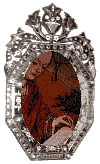|
Column for Rubric Material
**More about Marguerite of Porete **Threaded voices **General Navigation |
Although it was publicly burned, Marguerite Porete's The Mirror of Simple Annihilated Souls survives in some six versions, a total of fifteen manuscripts. It was translated into Old French, Old Italian, Middle English, and Latin. (The German version is still missing. Other reported copies seem to have unaccountably disappeared.) These manuscripts are 700 years old now; they are not widely available, but some portions of the texts can be found in inexpensive paperback editions and even on the WWW. As we convert and commit more and more of our printed literature to electronic form, we witness the persistence of Porete's work with some interest. Despite the fact that Marguerite Porete of Hainaut was herself burned at the stake, and regardless of the efforts to eliminate her books for centuries after, we can read her words with relative ease. In contrast, much of the early hypertext work, composed in Hypercard and other obsolete software, is nearly unreadable in any form today - barely ten years after it was written. Of course, any attempt to establish a direct analogy between electronic hypermedia authors and artists and Marguerite would falter. Not one hypermedia writer has been burned at any stake. Nor has there been any official censorship of electronic hypertext. Yet, some similarities might be observed. Hypermedia writers are, like Marguerite, working in an isolated and relatively obscure way. Their audience is small and self-selected. Many of them are not assisted by supporting institutions. And there has been much criticism surrounding hypertext literature. Similarly, Marguerite's Mirror advanced a daring and perhaps heretical interpretation of the human relationship to God. While a lesser crime, hypertext has been identified by some as a threat to literature. Marguerite is to be admired not only for her Mirror, but also for her courage in insisting that she be true to her own vision and for her serenity in accepting the consequences. Hypermedia writers may well need to emulate her saintly attitude. We do not know what anxieties Marguerite of Hainaut may have had about the survival of her person. Surely, the threat of death at the stake can be a powerful deterrent to authorship, publication, and distribution. The burning of the work itself, which occurred initially during her lifetime, may have been of more importance to her. In Mirror, she states: "If anyone should ask them if
they wished to be in Purgatory, these freed Souls, So, for Porete, the appreciation of her work, even by a select audience, seems to be of paramount concern. The survival of Marguerite of Hainaut's writing is but one example of the durability of printed words on a stable surface. Hypermedia writers have needed to persevere in their vision as well. But their work is far less likely to survive. Although not nearly so dramatic as a bonfire, the destruction of hypertext and hypermedia literature may be more thorough. The rapid pace of technology, particularly the change in platforms, has created a markedly unstable medium. And, the prospect of platform obsolescence may be exerting a subtle but profound effect on the authors and the scope of work they choose to undertake. While the writers and artists working in digital media are not in personal jeopardy, their work may be.
Recto / Permanence / Impermanence / Alteration / Obsolescence / Obliteration / Verso |
 Recto
Recto